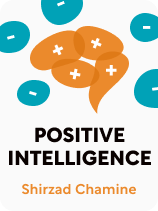

This article is an excerpt from the Shortform book guide to "Positive Intelligence" by Shirzad Chamine. Shortform has the world's best summaries and analyses of books you should be reading.
Like this article? Sign up for a free trial here.
Do you tend to self-sabotage? Is it possible to overcome destructive thinking patterns?
Shirzad Chamine’s book, Positive Intelligence, reveals that your stress and unhappiness stem from destructive patterns of thinking known as Saboteurs. In his book, Chamine offers guidance on engaging with your higher self, the Sage, to overcome these adversaries and enhance various aspects of your life.
Read on for a brief overview of Shirzad Chamine’s book Positive Intelligence.
Positive Intelligence Book Overview
In Shirzad Chamine’s book, Positive Intelligence, he explains that all of your stress and unhappiness is the result of antagonists in your brain—harmful patterns of thinking he calls Saboteurs—that sabotage your thinking and the way you experience life. Chamine provides advice on how to connect with your higher self—your Sage—to counteract these antagonists and improve every facet of your life. Most of his examples relate to improving your performance at work as leaders or teams, but he also explains how you can use your Sage to improve other areas of your life including parenting, performance in sports, finding meaning in your life, and improving your interpersonal relationships.
Shirzad Chamine is a best-selling author, lecturer, and coach who has trained hundreds of business executives. He has multiple advanced degrees, including a master’s degree in electrical engineering and an MBA from Stanford.
How Your Brain Sabotages Your Happiness and Success
According to Chamine’s book Positive Intelligence, all stress comes from harmful thought processes that interfere with our ability to behave and reason rationally. These thought processes developed as survival mechanisms, but in adulthood, they hinder our happiness and success in every aspect of our lives.
According to Chamine, our brains can either work against us or for us in promoting our happiness and success. When it works against us, it’s because the part of our brains that developed for pure survival is in charge. This part of the brain is responsible for keeping us safe from dangers to our well-being during childhood by helping us identify and avoid threats. For example, a bad grade is a threat to our academic well-being, so our survival brain might push us to study intensely to avoid that threat. However, when we become adults, the survival brain does more harm than good: It continues to exaggerate threats and push us into states of high stress over things we can overcome if we use the other part of our brain, the one that developed to help us thrive instead of just survive.
In adulthood, the survival brain manifests as different mental antagonists, which the author refers to as Saboteurs. These antagonists are tendencies our brains have to cope with stress in various unhealthy ways because our brain tells us that they’re the only ways to survive that stress.
Chamine adds the caveat that there are a few types of stress that are healthy: 1) the distress of mourning a loss and 2) the immediate, temporary distress that accompanies a negative event. This stress signals to you that the event could be damaging and that you need to do something to prevent further harm—like how the physical pain of using an injured limb signals you to stop using it to avoid further damage.
In his book Positive Intelligence, Chamine explains that there are a total of 10 Saboteurs:
- The Judge
- The Stickler
- The Pleaser
- The Hyper-Achiever
- The Victim
- The Hyper-Rational
- The Hyper-Vigilant
- The Restless
- The Controller
- The Avoider
Chamine writes that the Judge is distinct from the other nine Saboteurs, acting somewhat as their manager. Thus, we’ll discuss the Judge first and then group the other nine thematically and address them separately.
The Most Powerful Saboteur: The Judge
The Judge is the most dominant of all the Saboteurs. The Judge passes judgment on you, on others, and on your circumstances, finding faults in all of them—while also making you think you’re just being rational and trying to fix your or others’ flaws.
Self-judgment: The Judge tells you that you’re not good enough as you are, that your level of achievement determines if you’re worthy of love, and that if you allow yourself to be satisfied with who you are, you’ll stop improving and never be good enough. It tells you that you have to suffer to make yourself better and that happiness is just laziness.
Judgment of others: The Judge sets similarly unreachable standards for other people in your life. It causes you to fixate on the Saboteurs it sees in other people. When the other person picks up that you’re judging them, their Saboteur reacts poorly, which reinforces your Judge’s assessment of them and creates a harmful cycle.
Judgment of your circumstances: The Judge also tells you that “You can only be happy when” some future event happens. In this way, it places a condition on your happiness—however, your happiness shouldn’t have a timetable and shouldn’t need to be dependent on your future circumstances. This Judge also moves the goalposts every time you get close to the thing that’s supposed to make you happy: If your Judge tells you you won’t be happy until you get a six-figure job, when you finally get that job, the Judge now fixates again on a future event that must happen before you can be happy, like getting a new vacation home or a job that pays seven figures.
The Other Nine Saboteurs
Chamine writes in his book Positive Intelligence that the Judge also employs one or more of the other nine Saboteurs to develop patterns of unhealthy stress management and thinking. Which Saboteurs these are depends on your personality and your needs. Some of these Saboteurs share similar traits and themes, as we’ll explain below.
Critical Saboteurs
Some Saboteurs are characterized by a tendency to be overly critical and demand that we and others live up to their expectations.
The Hyper-Achiever is driven to impress others with personal achievements in order to feel good about themselves. They’re more concerned with how others view them than with staying true to themselves, and they alter their behavior and identity based on what they believe others would value rather than what they themselves value.

———End of Preview———
Like what you just read? Read the rest of the world's best book summary and analysis of Shirzad Chamine's "Positive Intelligence" at Shortform.
Here's what you'll find in our full Positive Intelligence summary:
- The ten ways your brain sabotages your happiness and success
- How to train your brain to overcome its sabotaging behaviors
- How to increase your level of positive intelligence with attentional exercises






